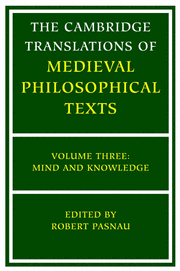Book contents
- Frontmatter
- Contents
- Acknowledgments
- General Introduction
- 1 ANONYMOUS (Arts Master c. 1225) The Soul and Its Powers
- 2 ANONYMOUS (Arts Master c. 1270) Questions on De anima I–II
- 3 BONAVENTURE Christ Our One Teacher
- 4 HENRY OF GHENT Can a Human Being Know Anything?
- 5 HENRY OF GHENT Can a Human Being Know Anything without Divine Illumination?
- 6 PETER JOHN OLIVI The Mental Word
- 7 WILLIAM ALNWICK Intelligible Being
- 8 PETER AUREOL Intuition, Abstraction, and Demonstrative Knowledge
- 9 WILLIAM OCKHAM Apparent Being
- 10 WILLIAM CRATHORN On the Possibility of Infallible Knowledge
- 11 ROBERT HOLCOT Can God Know More than He Knows?
- 12 ADAM WODEHAM The Objects of Knowledge
- Textual Emendations
- Bibliography
- Index
1 - ANONYMOUS (Arts Master c. 1225) The Soul and Its Powers
Published online by Cambridge University Press: 23 December 2009
- Frontmatter
- Contents
- Acknowledgments
- General Introduction
- 1 ANONYMOUS (Arts Master c. 1225) The Soul and Its Powers
- 2 ANONYMOUS (Arts Master c. 1270) Questions on De anima I–II
- 3 BONAVENTURE Christ Our One Teacher
- 4 HENRY OF GHENT Can a Human Being Know Anything?
- 5 HENRY OF GHENT Can a Human Being Know Anything without Divine Illumination?
- 6 PETER JOHN OLIVI The Mental Word
- 7 WILLIAM ALNWICK Intelligible Being
- 8 PETER AUREOL Intuition, Abstraction, and Demonstrative Knowledge
- 9 WILLIAM OCKHAM Apparent Being
- 10 WILLIAM CRATHORN On the Possibility of Infallible Knowledge
- 11 ROBERT HOLCOT Can God Know More than He Knows?
- 12 ADAM WODEHAM The Objects of Knowledge
- Textual Emendations
- Bibliography
- Index
Summary
Introduction
This short treatise was written around 1225, apparently by a professor of philosophy (“master of arts”) at the University of Paris. It is not an original work, in that almost all the author's claims are taken from other sources. But the way these claims are compiled and assimilated is itself interesting, and would be highly influential on later authors. Moreover, this work vividly captures the state of the art of scholastic philosophy in the early thirteenth century, and puts in context the achievements of later and better known figures.
Our author's principal source is Aristotle, as interpreted by Avicenna and Averroes. Although Avicenna is mentioned more often, this work is notable for marking the beginning of Averroes's influence on the Latin West. Averroes's extended commentary on the De anima, composed around 1190, was translated into Latin by Michael Scot around 1220. In just a few years, then, the Commentator's reputation was becoming established at the University of Paris.
Most significant in this regard is the discussion of the rational power (sec. III.C). Though our author scrambles some of the terminology, he closely follows Averroes's account of a “passive intellect,” inseparable from the body, and of a distinct “possible intellect” (equivalent to Averroes's “material intellect”). The treatise explicitly rejects Avicenna's treatment of agent intellect as separate from the soul, and seems to lean on Averroes in arguing that the agent intellect is “joined to the soul as its power.” This makes an ironic debut for Averroes in light of how he would later be understood (see Translation 2).
The fact that its authorship is unknown should not be taken to imply that this work was obscure.
- Type
- Chapter
- Information
- Publisher: Cambridge University PressPrint publication year: 2002

